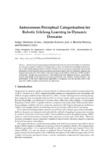Autonomous Perceptual Categorization for Robotic Lifelong Learning in Dynamic Domains
Title
Autonomous Perceptual Categorization for Robotic Lifelong Learning in Dynamic DomainsDate
2024Abstract
Autonomously acquiring grounded information from on-line interaction in continuous and dynamic domains unknown at design time, to allow for abstraction and high-level reasoning, is still a challenging problem in robotics. In this work we propose an approach based on the generation of task-based dynamic perceptual equivalence classes that are constantly updated and adapted during the life of the robot, using three types of algorithms within the e-MDB cognitive architecture. Results are presented for a robot interacting with different domains, demonstrating the adaptability of the approach through experiments with arbitrary domain changes. The performance of the three implemented algorithms is compared, and the possible uses of this approach within cognitive architectures are discussed.
Keywords
e-MDB cognitive architecture
Robot
Robot
Editor version
Rights
Atribución 4.0







